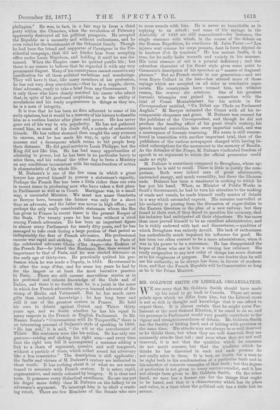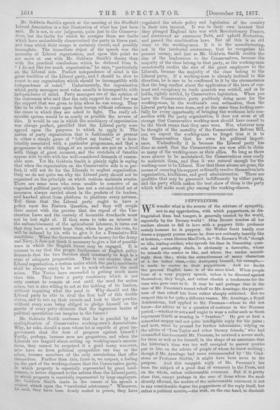MR. GOLDWIN SMITH ON LIBERAL ORGANISATION.
E are sorry that Mr. Goldwin Smith should have made up his mind to go back to Canada. There are many points upon which we differ from him, but the Liberal cause is not so rich in thought and knowledge that it can afford to export them. It is almost certain that he might enter Par- liament at the next General Election, if he cared to do so, and his presence in Parliament would very greatly contribute to the vigour and straightforwardness of debate. Mr. Goldwin Smith has the faculty of hitting hard, and of hitting with precision at the same time. His attacks may not always be as well deserved as he thinks them, but when they are well deserved, they are eminently attacks that tell ; and even when they are not well deserved, it is not that the qualities which be censures do not merit censure, but that the qualities which he thinks he has discerned in such and such persons do not really exist in them. It is best, no doubt, for a man to be right both in his condemnation of a particular fault and in his selection of concrete examples of that fault ; but this degree of perfection is not given to every controversialist, and it has not always been given to Mr. Goldwin Smith. On the other hand, no man has a keener eye for the things that ought to be hated, and that is a characteristic which has its place and value, in a time when the political salt has a little lost its savour.
Mr. CI oldwin Smith's speech at the meeting of the Sheffield Liberal Association is a fair illustration of what has just been said. He is not, in our judgment, quite just to the Conserva- tives, but the faults for which he arraigns them are faults which have undoubtedly characterised the party in times past, and from which their escape is certainly recent, and possibly incomplete. The immediate object of the speech was the necessity of Liberal organisation, and upon this point we are more at one with Mr. Gold win Smith's theory than with the practical conclusions which he deduced from it. "I do not like too much organisation," he says, "particularly on the Liberal side. Perfect independence of mind is the great tradition of the Liberal party, and I should be slow to resort to any organisation which should be incompatible with independence of mind." Unfortunately, the organisation which party managers most value usually is incompatible with independence of mind. Party managers are of the opinion of the statesman who said that the only support he cared for was the support that was given to him when he was wrong. They like to be able to count upon their troops without reference to the cause in which they are asked to fight. The really ad- mirable system would be as nearly as possible the reverse of' this. It would be one in which the machinery of organisation was always perfect, provided that the Liberal party were agreed upon the purposes to which to apply it. The nation of party organisation that is fashionable at present is either a simple game of "follow my leader," or is inex- tricably associated with a particular programme, and that a. programme in which things of no moment are put on a level with things of great moment, and the crotchets of fanatics appear side by side with the well-considered demands of reason- able men. Yet Mr. Goldwin Smith is plainly right in saying' that when the organisation on the Conservative side is so per- fect, it will not do for the Liberals to neglect organisation. Only we do not quite see why the Liberal party should not be organised on the principle on which nations maintain armies. There are some men who seem unable to conceive of an organised political party which has not a cut-and-dried set of measures always carried about in the pockets of its leaders, and hawked about from platform to platform every autumn. Tell them that the Liberal party ought to have a. policy upon the Eastern Question, and they will couple their assent with the proviso that the repeal of the Vac- cination Laws and the custody of incurable drunkards must not be lost sight of. If they seem to take an interest in the enfranchisement of the agricultural labourer, it turns out that they have a secret hope that, when he gets his vote, he will be induced by his wife to give it for a Permissive-Bill candidate.When the Government asks for money for the Army i
and Navy, t does not think it necessary to give a list of possible wars in which the English forces may be engaged. It is content to say that the proper furtherance of English policy demands that the two Services shall constantly be kept in a state of adequate preparation. This is our utopian idea of Liberal organisation, a system under which the party machinery shall be always ready to be set to work whenever the need arises. The Tories have succeeded in getting much more than this. They have a party machinery which is not only content to remain at rest until the need. for action arises, but is also willing to act at the bidding of its leaders, without inquiring what the need is. Why should not the Liberal party be able to rival the first half of this double virtue, and to rub up their swords and look to their powder, without every man being obliged to pledge himself on the merits of every petty skirmish that the ingenious brains of political speculators can imagine in the future ?
Mr. Gold win Smith confesses that he is puzzled by the multiplication of Conservative working-men's Associations. Why, he asks, should a man whose lot is capable of great im- provement shut the door of progress against himself ? Partly, perhaps, because men are gregarious, and when the Liberals are languid about setting up working-men's associa- tions, they cannot be surprised if a, good many waverers, who have no keen political sympathies one way or the other, become members of the only associations that offer themselves. Further than this, there is, we suspect, a feeling on the part of the working-classes that the Conservative party, an which property is especially represented by great land- owners, is better disposed to the artisan than the Liberal party, in which property is especially represented by large employers. Goldwin Smith made in the course of his speech a violent attack upon the "territorial aristocracy." Whenever, lie said, they have been firmly seated in power, they have regulated the whole policy and legislation of the country in their own interest. It was in their own interest that they plunged England into war with Revolutionary France, and contracted an enormous Debt, and upheld Protection, and passed the combination laws. But all this is an old story to the working-man. It is in the manufacturing, not in the territorial aristocracy, that he recognises his present enemy, and just as Mr. Coldwin Smith credits the sins of the landowners to the Conservatives, because the majority of the class belong to that party, so the working-man occasionally credits the sins of the great employers to the Liberals, because the majority of the class belong to the Liberal party. If a working-man is already. inclined in this direction, he is sure to be confirmed in it by the circumstance that the long conflict about the application of the laws of con- tract and conspiracy to trade quarrels was settled, and as he holds, rightly settled, by Conservative legislation. When you have the Conservative party positively doing more for the working-man, in the workman's own estimation, than the Liberal party has ever done, and at the same time looking care- fully for every opportunity of bringing the workman into con- nection with the party organisation, it does not seem at all strange that Conservative w,orking-men should have ceased to be the black swans that they once were. Nor, whatever may be thought of the morality of the Conservative Reform Bill, can we expect the working-man to forget that it is to the Conservatives that he owes his political import- ance. Undoubtedly it is because the Liberal party has done so much that the Conservatives are now able to claim so many of the working-men as their allies. So long as there were abuses to be maintained, the Conservatives were ready to maintain them, and then it was natural enough for the working-man to be Liberal. Now that these abuses are gone, the means of ensuring his support ordinarily resolve themselves into organisation, kindliness, and good administration. These are qualities that may be possessed indifferently by 'either party, and the party which makes the beat show of them is the party which will make most play among the working-classes.







































 Previous page
Previous page